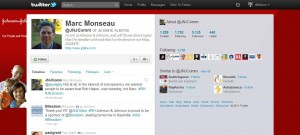 Social media marketing presents challenges for every company in defining the appropriate voice for the brand and how to engage. However, some companies are forced to work within much stricter guidelines such as those in heavily regulated industries. Does that mean social media shouldn’t be part of the marketing and communications mix? No.
Social media marketing presents challenges for every company in defining the appropriate voice for the brand and how to engage. However, some companies are forced to work within much stricter guidelines such as those in heavily regulated industries. Does that mean social media shouldn’t be part of the marketing and communications mix? No.
Companies that are using fear of regulations or lack of guidance as an excuse to sit on the social media sidelines are missing out on important opportunities to enhance their online presence and connect with their customers. Fear should never be the driving factor for a business.
Pharmaceutical marketing is highly regulated by the FDA and the Division of Drug Marketing and Communications (DDMAC). Pharma marketing is extremely competitive and lacking in clear social media boundaries based on current regulatory guidance.
Yet some healthcare and pharma companies are doing good work in the space, finding ways to connect physicians via secure social networks to improve information sharing for example. In absence of definitive social media policy from the FDA, pharmaceutical companies need to work closely with their legal team along with marketing professionals (whether internal or external) with a strong understanding of social media engagement to ensure that the spirit of the laws are being followed despite a gray area until formal social media guidance is released.
Despite many of the logical concerns about discussing health issues in such a public forum, companies working within guidelines that have long applied to Direct-to-Consumer (DTC) advertising and patient communications can operate effectively. In 2010, of 52 warning and notice of violation letters sent from DDMAC to companies only one was issued in the social media space. Clearly if pharmaceutical companies follow existing marketing guidelines the risks aren’t off the charts.
Pharma companies need to think beyond direct product promotion when using social tools. Johnson & Johnson has created an active social presence that utilizes a blog focused on stories of employees, wellness information, and corporate content. The blog contains robust content and is supplemented with YouTube and Facebook pages. J&J also connects with with community members via communications staffer Marc Monseau who tweets on behalf of the brand in a more personal voice.
Things to consider when working in a highly regulated market – Healthcare
- Educate everyone involved on the importance of social media for the company – Begin the process by highlighting the need to be . The pharmaceutical industry has been hesitant about social for years. However, consumers will be talking about you whether you are there or not.
- Stay in close contact with your legal team – Often times marketers and attorneys approach risk-reward scenarios with differing perspectives, working with your counsel is essential in social media marketing. Think creatively on how to advance your brand goals and provide your legal team with multiple campaigns. Find ways to problem solve with your counsel.
- Stay on label and create options for sharing risk information in multiple formats – Because the channels for sharing have changed, it doesn’t mean that pharmaceutical companies can omit risk information.
- Create strong internal guidelines for social media objectives – Prior to beginning any social media program, establish controls and expectations of staff that would be involved in public engagement. Much like our social media checklist, create a list of regulatory boundaries and potential scenarios where legal counsel would be notified of consumer concerns. Once approved, set frequent reviews of the social media program to identify potential pitfalls around key regulations like patient privacy or adverse events.
- Tell human stories – The importance of health is a universally shared value. Social media is driven by the inherent desire in people to seek connections. Identify compelling stories that highlight benefits of the medication. Success stories like these should be reviewed and submitted in compliance with established DDMAC process but, once approved, can be shared through social channels to demonstrate real impact in the lives of consumers and enhance public goodwill toward the company.
Are there greater risks in highly regulated industries? Absolutely. Yet there ways to work within the rules and use social media in the pharmaceutical industry effectively and for the benefit of the company and patients.



